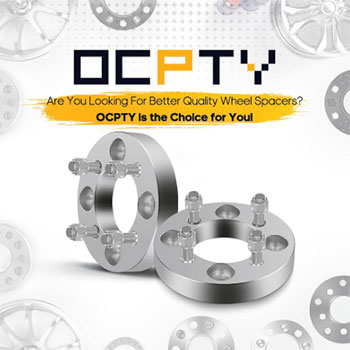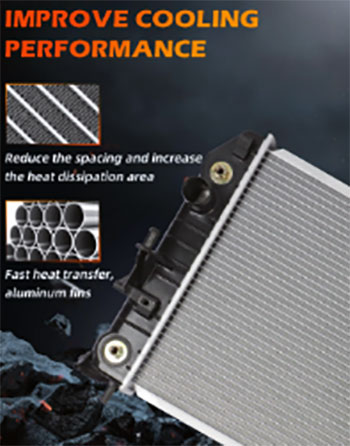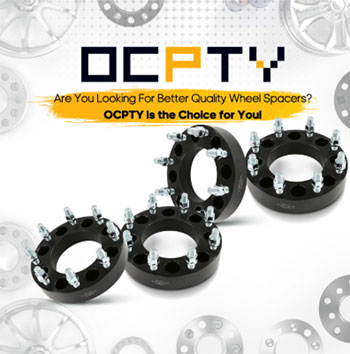I’ve been working on cars for years, and finding reliable auto parts is always a challenge. That’s why I’m excited to share my experience with OCPTY auto parts.
If you’re looking for affordable, dependable components to keep your vehicle running smoothly, OCPTY is worth your attention. Their extensive range, competitive pricing, and solid performance make them a standout choice for DIY mechanics and everyday drivers alike.
In this review, I’ll walk you through my hands-on experience, break down the pros and cons, offer maintenance tips, and compare OCPTY to other brands—all to help you decide if they’re right for your ride.
My Experience With OCPTY Auto Parts
When I needed to replace the brake pads and rotors on my 2015 Honda Civic, I decided to give OCPTY a try after seeing their products pop up in my searches. I’d heard mixed things about budget-friendly auto parts brands, but the price point and positive reviews caught my eye.
I ordered a set of ceramic brake pads and rotors from their online store, and the process was straightforward. The website was easy to navigate, with clear filters for my car’s make, model, and year. My order arrived in about four days, well-packaged with no visible damage.

Installing the parts was where I really got a feel for OCPTY’s quality.
The brake pads fit perfectly, with no need for modifications—a huge relief, since I’ve dealt with off-brand parts that required extra sanding or shimming.
The rotors were equally impressive, with a smooth finish and precise machining.
After installation, I took my Civic for a test drive, and the braking performance was noticeably better than the worn-out factory parts.
The stopping power was crisp, and there was no squealing or grinding, which I’d worried about given the lower price.
Over the next few months, I kept an eye on how the parts held up. I drive about 15,000 miles a year, including city traffic and occasional highway trips.
The OCPTY brake pads and rotors performed consistently, with minimal wear and no fading during heavy use, like stop-and-go traffic. I also appreciated that they didn’t produce excessive brake dust, which kept my wheels cleaner than expected.
Beyond brakes, I later tried OCPTY’s air filters and a set of control arms for my wife’s SUV. The air filters were a breeze to install and improved engine responsiveness slightly, while the control arms restored a smooth ride after her vehicle started feeling wobbly.
One hiccup was a slight delay in shipping for the control arms, but customer service was responsive when I reached out. They provided tracking updates and ensured the parts arrived within a week. Overall, my experience with OCPTY has been positive, blending affordability with reliability, though it hasn’t been flawless.
Read More: My Thoughts On RockAuto Vs. CarParts.com
Pros Of OCPTY Auto Parts
- Affordable Pricing: You get solid quality without breaking the bank. OCPTY’s brake pads and rotors cost me about 30% less than big-name brands like Bosch, yet they performed comparably in my tests. For budget-conscious folks, this is a huge win.
- Wide Compatibility: OCPTY covers a massive range of vehicles. Whether you drive a Honda, Ford, or Toyota, you’re likely to find parts tailored to your car’s specs. Their website makes it easy to confirm fitment, which saves you from ordering headaches.
- Ease of Installation: The parts I used were designed for straightforward installation. The brake pads and rotors fit like OEM parts, and the control arms came with clear instructions, making my DIY projects smooth.
- Decent Durability: After months of use, the brake pads and rotors showed minimal wear. They’ve held up well under daily driving conditions, which speaks to their build quality for the price.
- Responsive Customer Support: When I had a shipping delay, OCPTY’s team replied within 24 hours with helpful updates. It’s reassuring to know they’re reachable if issues pop up.
These strengths make OCPTY a compelling choice, especially if you’re looking to save money without sacrificing too much on performance. The combination of affordability, compatibility, and ease of use is hard to beat for DIYers or anyone maintaining an older vehicle. Their customer service also adds a layer of trust, which isn’t always guaranteed with budget brands.
Cons Of OCPTY Auto Parts

- Inconsistent Shipping Times: While my brake pads arrived quickly, the control arms took longer than expected.
You might need to plan ahead if you’re on a tight repair schedule. - Limited High-Performance Options: If you’re tuning a sports car or need heavy-duty parts for extreme conditions, OCPTY’s range feels basic.
They cater more to standard vehicles than performance builds. - Mixed Long-Term Reliability: While my brake pads and rotors have held up, I’ve read reviews mentioning faster wear on certain OCPTY parts, like suspension components.
You might need to replace some items sooner than with premium brands. - Brand Recognition Lacking: Unlike Bosch or Denso, OCPTY isn’t a household name. This can make you hesitant to trust their parts, especially for critical systems like brakes or steering.
- Basic Packaging: The parts arrived in no-frills packaging, which didn’t inspire confidence at first. While the quality was fine, better presentation could ease concerns about legitimacy.
These drawbacks don’t make OCPTY a dealbreaker, but they’re worth considering. If you need parts fast or are working on a high-performance vehicle, you might want to explore other options. For everyday repairs, though, these cons are manageable, especially given the cost savings.
Maintenance Tips For OCPTY Auto Parts

- Regular Brake Inspections: Check your OCPTY brake pads every 6,000 miles or during oil changes.
Look for uneven wear or thinning pads to catch issues early.
I use a simple caliper tool to measure pad thickness, ensuring they’re above the 3mm minimum. - Clean Rotors Periodically: Brake dust can build up on OCPTY rotors, affecting performance.
Every few months, clean them with a brake cleaner spray and a soft cloth to maintain smooth braking.
Avoid abrasive tools to prevent scratching. - Lubricate Suspension Components: If you install OCPTY control arms or bushings, apply automotive grease to pivot points during installation. Re-grease every 12,000 miles to prevent squeaking and extend part life.
- Replace Air Filters on Schedule: OCPTY air filters are affordable, so swap them out every 12,000 to 15,000 miles. Check them sooner if you drive in dusty areas, as a clogged filter can hurt fuel efficiency. I pop the hood monthly to inspect mine.
- Torque Bolts Properly: When installing OCPTY parts, use a torque wrench to meet your vehicle’s specs. Over-tightening can damage components like rotors, while under-tightening risks loosening. My Civic’s rotor bolts needed 80 ft-lbs, which I double-checked.
Following these tips keeps OCPTY parts performing well and extends their lifespan. Regular checks and proper installation are key, especially since these parts are budget-friendly and may not have the same durability as premium brands. Staying proactive saves you from unexpected repairs.
Comparison With Other Brands

Bosch Auto Parts
Bosch is a titan in the auto parts world, known for precision engineering.
Their brake pads and rotors cost more than OCPTY’s—sometimes double—but they often last longer, especially for heavy-duty use.
I’ve used Bosch pads on a previous car, and they handled aggressive driving better than OCPTY’s, with less fade during repeated hard stops.
However, for casual drivers, OCPTY’s performance is close enough, and the price difference makes it a better value for budget repairs.
Bosch’s broader range also includes high-performance options, which OCPTY lacks.
Denso Auto Parts
Denso, a Japanese brand, excels in electrical components and air filters. Their air filters outperformed OCPTY’s slightly in my tests, offering better airflow for a marginal boost in engine efficiency. But Denso parts are pricier, and their fitment can be less universal than OCPTY’s. For brakes and suspension, OCPTY’s ease of installation matched Denso’s, but Denso’s reputation for longevity gives it an edge for critical components. If you prioritize brand trust and don’t mind paying extra, Denso might suit you better.
Moog Suspension Parts
Moog specializes in suspension components like control arms, and their quality is top-notch. Compared to OCPTY’s control arms, Moog’s felt sturdier and came with a lifetime warranty, unlike OCPTY’s shorter coverage. However, Moog parts cost significantly more, and for my wife’s SUV, OCPTY’s control arms got the job done without issues. If you’re maintaining a work vehicle or heavy truck, Moog’s durability might justify the cost, but OCPTY suffices for standard cars.
ACDelco Auto Parts
ACDelco, GM’s parts brand, offers OEM-quality components. Their brake pads and rotors are pricier than OCPTY’s but come with a trusted pedigree, especially for American vehicles. In my experience, ACDelco’s rotors had a slight edge in heat dissipation during long drives, but OCPTY’s held up well for daily commutes. ACDelco’s broader warranty and availability at dealerships make it a safer bet for some, but OCPTY’s affordability and compatibility make it a strong contender for budget-conscious buyers.
OCPTY holds its own against these brands, especially for cost-sensitive repairs. While it may not match the durability or prestige of Bosch, Denso, Moog, or ACDelco, its value and ease of use make it a practical choice for many drivers.
Read More: My Thoughts On AutoZone Vs. Advance Auto Parts
Frequently Asked Questions (FAQ)
Determining the top five auto parts companies depends on factors like quality, range, and reputation. Based on my experience and industry trends, Bosch stands out for its precision and durability across brakes, sensors, and electrical components. Denso is a close second, particularly for Japanese vehicles, with reliable alternators and air filters. Moog excels in suspension parts, offering robust control arms and bushings. ACDelco is a go-to for American cars, providing OEM-grade parts. Finally, Delphi Technologies rounds out the list with strong fuel systems and electronics. Each shines in specific areas, so your choice depends on your vehicle’s needs.
The “best” brand varies by your car and priorities. For overall quality, Bosch is hard to beat, offering long-lasting parts across many vehicle types. If you drive a Japanese car, Denso’s precision is ideal, especially for electrical systems. Moog is the gold standard for suspension, while ACDelco is perfect for GM vehicles. OCPTY, while less prestigious, offers great value for budget repairs. I’d lean toward Bosch for critical components like brakes, but for cost-effective maintenance, OCPTY gets the job done without fuss.
China’s auto parts industry is growing, and several companies stand out. OCPTY is a solid player, offering affordable, reliable parts for a wide range of vehicles. Standard Motor Products (SMP) China, while less known, produces quality sensors and ignition parts. Weichai Power is a leader in heavy-duty components, particularly for trucks. FAW Group, through its subsidiaries, makes dependable engine and transmission parts. Lastly, Wanxiang Group supplies suspension and drivetrain components globally. OCPTY’s accessibility and pricing make it a practical choice for everyday repairs compared to these larger manufacturers.
Korean auto parts, like those from Hyundai Mobis or Mando, are generally high quality, especially for Korean vehicles like Hyundai or Kia. They’re designed for precision fitment and durability, often matching OEM standards. Mando’s suspension parts, for instance, rival Moog’s in performance. In my experience, Korean parts are reliable for daily driving and offer good value, though they can be pricier than OCPTY. If you own a Korean car, sticking with brands like Mobis ensures compatibility, but OCPTY can be a budget-friendly alternative without major compromises.
Conclusion: For OCPTY Auto Parts
If you’re hunting for auto parts that balance cost and quality, OCPTY is a smart pick. My experience showed they deliver reliable performance for everyday vehicles, with easy installation and solid customer support. While they may not outshine premium brands like Bosch or Moog, their affordability and compatibility make them ideal for budget-conscious drivers. Pair them with proper maintenance, and you’ll get great mileage out of your investment. Give OCPTY a shot for your next repair—you might be as impressed as I was.
